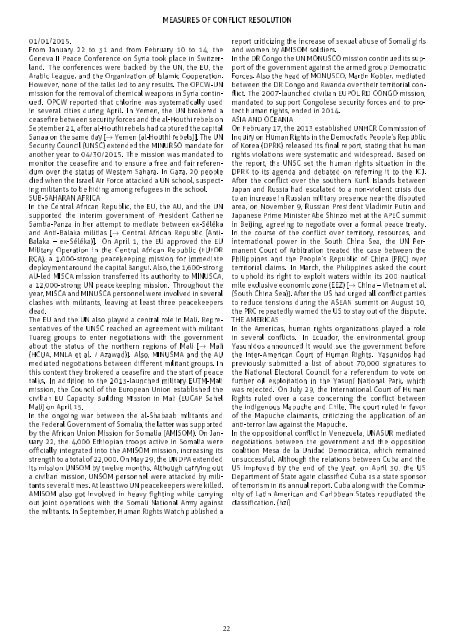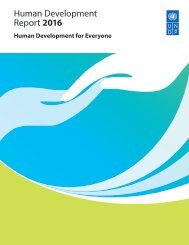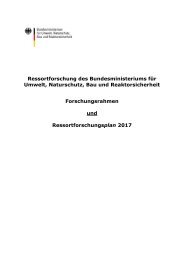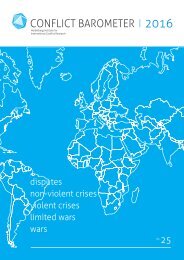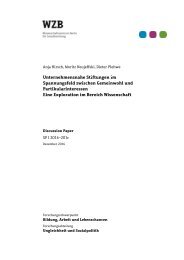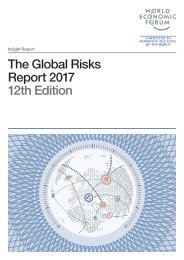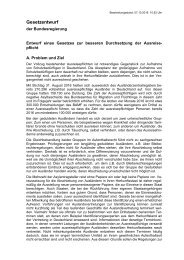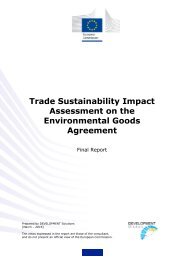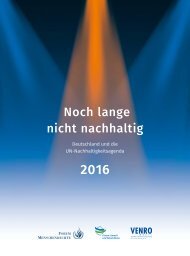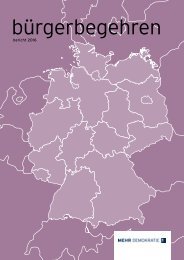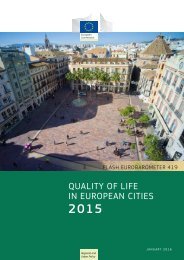79PFnGscZ
79PFnGscZ
79PFnGscZ
Create successful ePaper yourself
Turn your PDF publications into a flip-book with our unique Google optimized e-Paper software.
MEASURES OF CONFLICT RESOLUTION<br />
01/01/2015.<br />
From January 22 to 31 and from February 10 to 14, the<br />
Geneva II Peace Conference on Syria took place in Switzerland.<br />
The conferences were backed by the UN, the EU, the<br />
Arabic League, and the Organization of Islamic Cooperation.<br />
However, none of the talks led to any results. The OPCW-UN<br />
mission for the removal of chemical weapons in Syria continued.<br />
OPCW reported that chlorine was systematically used<br />
in several cities during April. In Yemen, the UN brokered a<br />
ceasefire between security forces and the al-Houthi rebels on<br />
September 21, after al-Houthi rebels had captured the capital<br />
Sanaa on the same day [→ Yemen (al-Houthi rebels)]. The UN<br />
Security Council (UNSC) extended the MINURSO mandate for<br />
another year to 04/30/2015. The mission was mandated to<br />
monitor the ceasefire and to ensure a free and fair referendum<br />
over the status of Western Sahara. In Gaza, 20 people<br />
died when the Israel Air Force attacked a UN school, suspecting<br />
militants to be hiding among refugees in the school.<br />
SUB-SAHARAN AFRICA<br />
In the Central African Republic, the EU, the AU, and the UN<br />
supported the interim government of President Catherine<br />
Samba-Panza in her attempt to mediate between ex-Séléka<br />
and Anti-Balaka militias [→ Central African Republic (Anti-<br />
Balaka ex-Séléka)]. On April 1, the EU approved the EU<br />
Military Operation in the Central African Republic (EUFOR<br />
RCA), a 1,000-strong peacekeeping mission for immediate<br />
deployment around the capital Bangui. Also, the 1,600-strong<br />
AU-led MISCA mission transferred its authority to MINUSCA,<br />
a 12,000-strong UN peacekeeping mission. Throughout the<br />
year, MISCA and MINUSCA personnel were involved in several<br />
clashes with militants, leaving at least three peacekeepers<br />
dead.<br />
The EU and the UN also played a central role in Mali. Representatives<br />
of the UNSC reached an agreement with militant<br />
Tuareg groups to enter negotiations with the government<br />
about the status of the northern regions of Mali [→ Mali<br />
(HCUA, MNLA et al. / Azawad)]. Also, MINUSMA and the AU<br />
mediated negotiations between different militant groups. In<br />
this context they brokered a ceasefire and the start of peace<br />
talks. In addition to the 2013-launched military EUTM-Mali<br />
mission, the Council of the European Union established the<br />
civilian EU Capacity Building Mission in Mali (EUCAP Sahel<br />
Mali) on April 15.<br />
In the ongoing war between the al-Shabaab militants and<br />
the Federal Government of Somalia, the latter was supported<br />
by the African Union Mission for Somalia (AMISOM). On January<br />
22, the 4,000 Ethiopian troops active in Somalia were<br />
officially integrated into the AMISOM mission, increasing its<br />
strength to a total of 22,000. On May 29, the UNDPA extended<br />
its mission UNSOM by twelve months. Although carrying out<br />
a civilian mission, UNSOM personnel were attacked by militants<br />
several times. At least two UN peacekeepers were killed.<br />
AMISOM also got involved in heavy fighting while carrying<br />
out joint operations with the Somali National Army against<br />
the militants. In September, Human Rights Watch published a<br />
report criticizing the increase of sexual abuse of Somali girls<br />
and women by AMISOM soldiers.<br />
In the DR Congo the UN MONUSCO mission continued its support<br />
of the government against the armed group Democratic<br />
Forces. Also the head of MONUSCO, Martin Kobler, mediated<br />
between the DR Congo and Rwanda over their territorial conflict.<br />
The 2007-launched civilian EUPOL RD CONGO mission,<br />
mandated to support Congolese security forces and to protect<br />
human rights, ended in 2014.<br />
ASIA AND OCEANIA<br />
On February 17, the 2013 established UNHCR Commission of<br />
Inquiry on Human Rights in the Democratic People's Republic<br />
of Korea (DPRK) released its final report, stating that human<br />
rights violations were systematic and widespread. Based on<br />
the report, the UNSC set the human rights situation in the<br />
DPRK to its agenda and debated on referring it to the ICJ.<br />
After the conflict over the southern Kuril Islands between<br />
Japan and Russia had escalated to a non-violent crisis due<br />
to an increase in Russian military presence near the disputed<br />
area, on November 9, Russian President Vladimir Putin and<br />
Japanese Prime Minister Abe Shinzo met at the APEC summit<br />
in Beijing, agreeing to negotiate over a formal peace treaty.<br />
In the course of the conflict over territory, resources, and<br />
international power in the South China Sea, the UN Permanent<br />
Court of Arbitration treated the case between the<br />
Philippines and the People's Republic of China (PRC) over<br />
territorial claims. In March, the Philippines asked the court<br />
to uphold its right to exploit waters within its 200 nautical<br />
mile exclusive economic zone (EEZ) [→ China Vietnam et al.<br />
(South China Sea)]. After the US had urged all conflict parties<br />
to reduce tensions during the ASEAN summit on August 10,<br />
the PRC repeatedly warned the US to stay out of the dispute.<br />
THE AMERICAS<br />
In the Americas, human rights organizations played a role<br />
in several conflicts. In Ecuador, the environmental group<br />
Yasunidos announced it would sue the government before<br />
the Inter-American Court of Human Rights. Yasunidos had<br />
previously submitted a list of about 70,000 signatures to<br />
the National Electoral Council for a referendum to vote on<br />
further oil exploitation in the Yasuní National Park, which<br />
was rejected. On July 29, the International Court of Human<br />
Rights ruled over a case concerning the conflict between<br />
the indigenous Mapuche and Chile. The court ruled in favor<br />
of the Mapuche claimants, criticizing the application of an<br />
anti-terror law against the Mapuche.<br />
In the oppositional conflict in Venezuela, UNASUR mediated<br />
negotiations between the government and the opposition<br />
coalition Mesa de la Unidad Democrática, which remained<br />
unsuccessful. Although the relations between Cuba and the<br />
US improved by the end of the year, on April 30, the US<br />
Department of State again classified Cuba as a state sponsor<br />
of terrorism in its annual report. Cuba along with the Community<br />
of Latin American and Caribbean States repudiated the<br />
classification. (hzi)<br />
22


